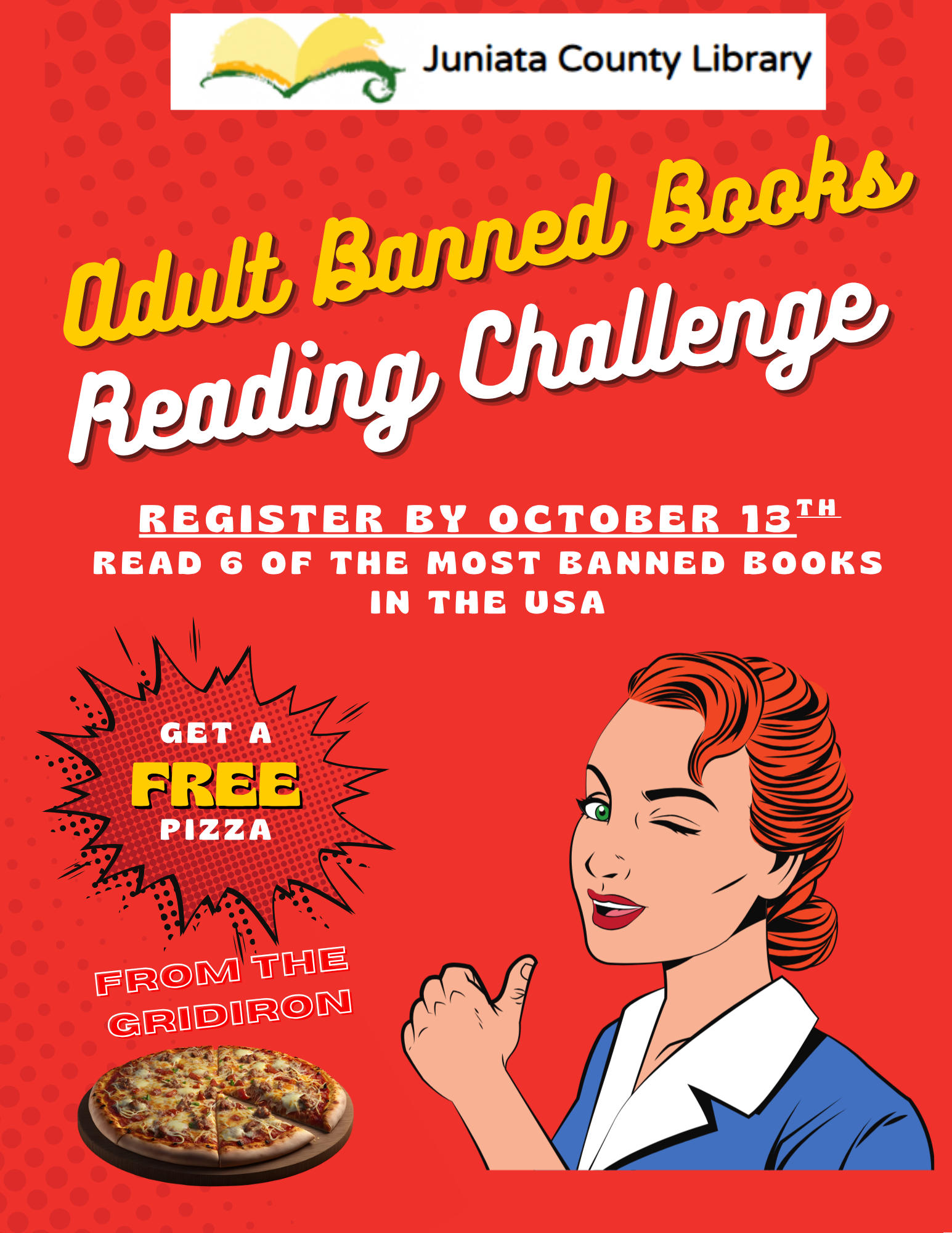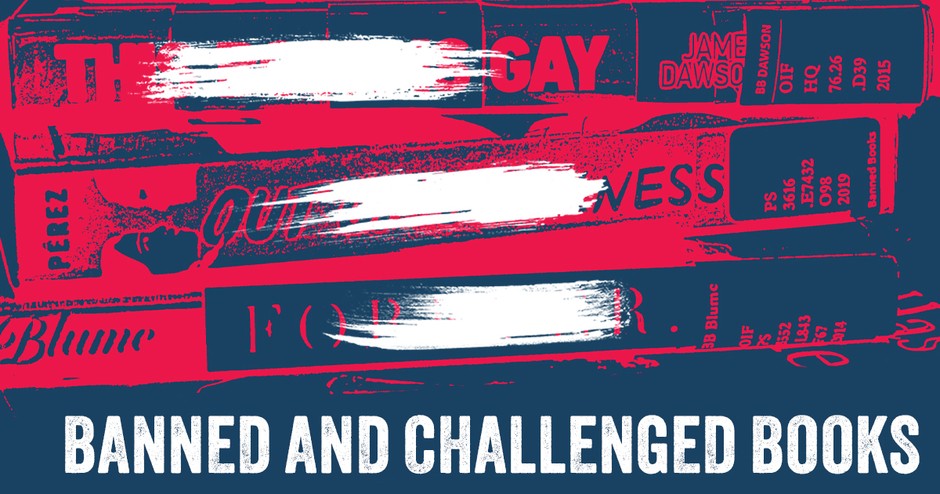Adult Banned Books Reading Challenge

Through a generous private donation, we are giving away one (1) gift card for a free large cheese pizza to anyone who reads 6 of the most-banned books at other libraries in the country. The gift cards will be for the Gridiron Pizza in Mifflintown PA.
Here is how it works:
1) Register to participate by Monday, October 13th. After that day, registration will be closed.
2) The challenge begins the same day, Monday, October 13th, and ends Saturday, December 13th.
3) One entry per person.
4) Read any 6 books from our banned book list. Only books checked out from the library count. You can also choose from our books on CD and digital collection by using the Libby app. Search our catalog to locate 6 books. For a book series, you do not have to read all of the books in the series for it to count; each book you read in the series counts as one (1) book.
5) Record your books on the reading log and once complete, return it to the library either in-person or via email (juniatalibrary@juniatalibrary.org). You will be contacted after December 13th with details on how to get your gift card for a free large cheese pizza from the Gridiron Pizza.
Be on the lookout for the banned book display in the library! It will be filled with books that you can read for the challenge.
Get the challenge materials (download links below; print copies available at the library)
- Register to participate by Monday, October 13th.
- Banned book reading log: for recording your 6 books.
- Banned book reading list: the list is grouped by target age group and shelving location, then listed alphabetically by the author's last name. It includes the call number and reason(s) the book was banned at other libraries in the United States.
- Search our catalog
Learn more about Banned Book Week and Intellectual Freedom.

Frequently Asked Questions
What is a banned book?
A challenge is an attempt to remove or restrict materials, based upon the objections of a person or group. A banning is the removal of those materials. At this time there are no banned books at the Juniata County Library.
Why do books get banned?
Why do people ban books? Often it’s for religious or political reasons: An idea, a scene or a character in the book offends their religion, sense of morality or political view. Some folks feel they must protect children from cursing, morally offensive behavior or racially insensitive language in a book. Or they think a book’s content is too violent or too sexual.
Who gets a book banned?
Parents, school board members, individuals and groups are typically the source for getting a book banned from a library. Yet what’s considered offensive may depend on the era or specific community. These challenges pose a threat to freedom of speech and choice — freedoms Americans hold dear and are worth standing up for.
Why read banned books?
What do “The Adventures of Huckleberry Finn,” “The Catcher in the Rye,” “The Great Gatsby,” “Native Son,” “To Kill a Mockingbird,” “Fahrenheit 451” and “The Adventures of Captain Underpants” have in common? At one time or another, someone has tried to ban them from classrooms and public or school libraries.
The freedom to read is essential to our democracy, and reading is among our greatest freedoms.
Learn more about book bans in schools and public libraries.
Today’s edgy is tomorrow’s classic. Original work pushes boundaries in topic, theme, plot and structure. What’s shocking today may be assigned in English class five or 10 years from now if it has true literary merit. “The Great Gatsby” is a high school staple today, but it was shocking when its gin-soaked pages were published in 1925.
There’s more to a book than the swear words in it. Many books have been banned for language that your kid has encountered before or will encounter soon. Even potty humor (like in “Captain Underpants”) has caused people to call for a ban. A character’s language may add realism to the story, or it may seem gratuitous or distracting — your kids can make their own judgments.
Kids crave relatable books. Banned books often deal with subjects that are realistic, timely and topical. Young people may find a character going through exactly what they are, which makes it a powerful reading experience and helps the reader sort out thorny issues such as grief, divorce, sexual assault, bullying, prejudice and sexual identity. The compelling teen rebels story “The Outsiders” has been banned, yet many middle-schoolers cite it as the book that turned them into readers.
Controversial books are a type of virtual reality. Exploring complex topics such as sexuality, violence, substance abuse, suicide and racism through well-drawn characters lets kids contemplate morality and vast aspects of the human condition, build empathy for people unlike themselves and possibly discover a mirror of their own experience. “Roll of Thunder, Hear My Cry” is an eye-opening story of an African American family facing racism in 1930s Mississippi, yet it has been banned for having racial slurs.
They’ll kick off a conversation. What did people find so disturbing in a book that they wanted to ban it, and to what extent was it a product of its time or did it defy social norms of its era? For example, the Harry Potter books were banned by people who felt they promoted magic. Reading a challenged book is a learning experience and can help your kids define their own values and opinions of its content.
What is Banned Book Week?

Banned Books Week was launched in 1982 in response to a sudden surge in the number of challenges to books in libraries, bookstores, and schools. By focusing on efforts to remove or restrict access to books, Banned Books Week draws national attention to the harms of censorship. Typically (but not always) held during the last week of September, the annual event highlights the value of free and open access to information and brings together the entire book community — librarians, educators, authors, publishers, booksellers, and readers of all types — in shared support of the freedom to seek and to express ideas.
In a time of intense political polarization, library staff in every state are facing an unprecedented number of attempts to ban books. ALA's Office for Intellectual Freedom (OIF) documented 1,247 demands to censor library books and resources in 2023. The number of titles targeted for censorship surged 65% in 2023 compared to 2022, reaching the highest levels ever documented by OIF in more than 20 years of tracking: 4,240 unique book titles were targeted for removal from schools and libraries. This tops the previous high from 2022, when 2,571 unique titles were targeted for censorship. Titles representing the voices and lived experiences of lesbian, gay, bisexual, transgender, queer (or questioning their gender), intersex, asexual, or their allies (LGBTQIA+) and black, indigenous, and other people of color (BIPOC) individuals made up 47% of those targeted in censorship attempts.
We can find freedom in the pages of a book — but book bans and censorship threaten that freedom, along with many other rights and institutions. During Banned Books Week 2024 and beyond, let’s share our love of right to read and the freedom found in books. Let’s be Freed Between the Lines!
